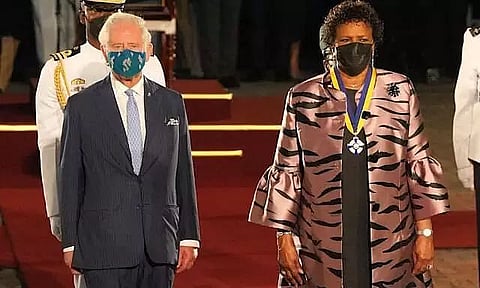
- Home
- Live Blog
- Breaking News
- Top Headlines
- Cities
- NE News
- Sentinel Media
- Sports
- Education
- Jobs

Barbados, a former British colony, became a republic on Tuesday, nearly 400 years after the first English Royals ruled the land.
In a stunning celebration that began late Monday, the tiny Caribbean nation deposed Queen Elizabeth II as its constitutional monarch, dissolving its connections with the British royal family — and along with it, one of the island's final surviving colonial links to the United Kingdom.
The celebration took place on the 55th anniversary of Barbados' complete independence, but the monarch remained in a ceremonial position. To the delight of local spectators, the new republic was formed at the stroke of midnight local time. A 21-gun salute and the performance of the Barbadian national song honoured the occasion.
Prime Minister Mia Mottley declared singer Rihanna, a Barbadian citizen as well as an international icon, a national hero after a spectacular performance of fireworks, dancing, and music.
Sandra Mason, a Barbadian, was ushered in as the nation's first president after serving as the island's governor-general — or queen's representative. Last month, Parliament elected her to the position of figurehead, although Mottley will remain to lead the country.
"It's a historic move," Kristina Hinds, a senior lecturer in political science at the University of the West Indies in eastern Barbados, said before of the event on a Zoom call from her home in Wanstead, north of the capital, Bridgetown. "I believe it is a necessary component of our independence's progress, and it is long overdue."
The heir to the British throne, Prince Charles, was in presence as Barbados marked the termination of its official ties with his 95-year-old mother. In addition to the United Kingdom, Australia, Canada, and Jamaica, Elizabeth is the monarch of 15 additional countries. In an address, Charles said that the republic's founding "offers a new beginning," while his mother sent her "warmest well wishes" to the island in a message.
"People of this island have created their path with incredible courage from the darkest times of our heritage and the horrific horror of slavery, which permanently stains our history," he added.
His appearance might indicate the royal family's wish to preserve close ties with the island, which also will remain a member of the Commonwealth, a voluntary union of 54 governments that comprises many former British territories and which the queen has promoted throughout her life.
Hinds, on the other hand, finds Charles' presence metaphorically "a little weird." "It's troublesome for those of us who think that, as essential as the Royal family has traditionally been for Barbados in wonderful ways, it has also brought considerable harm to the country," she added.
Barbados was seized by the British in the 17th century, and it was developed into a prosperous colony by employing the labour of hundreds of thousands of African slaves. It became a key centre for sugar production, an increasingly important commodity that enriched British slave owners.
"White consumer lives built on the backs of black exploitation and slave labour," said Christopher Prior, associate professor of colonial and postcolonial history at the University of Southampton in the United Kingdom. The island's current population of around 287,000 inhabitants is primarily made up of descendants of African slaves transported over to work on the plantations.
Also Watch: